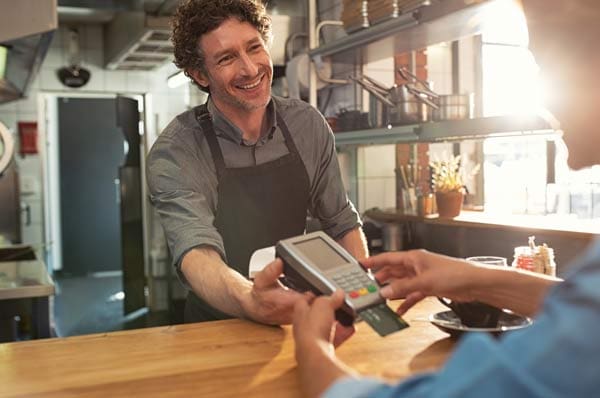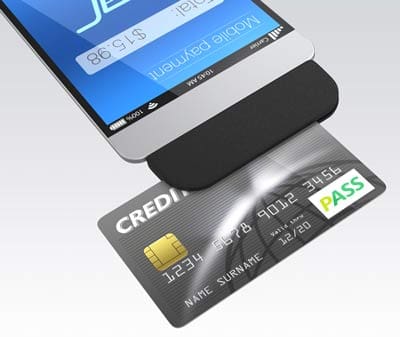
Purchasing the right credit card machine, or card terminal is heavily dependent on where and how business owners have structured their organization.
How you choose to process credit card transactions is vital to your business. It could even affect whether or not a customer decides to go through with a purchase. If you are new to this concept, check out our Complete Guide to Credit Card Processing.
Table of Contents
ToggleDo You Need A Credit Card Terminal?
Is your business a retail business or do you specialize in wholesale? If you own a physical location (brick and mortar store), a wired credit card machine is what you’ll see at every point of sale.
If you own a mobile business, a wireless credit card machine might be the better option. Are you an online store? A physical terminal will have a hard time meeting your needs.
A virtual terminal interface is designed to protect every card transaction that you process. Without a physical card present to swipe, virtual terminals act on their behalf. Learn more about virtual terminal interfaces here.
Each of these businesses operates differently and need different machines for accepting credit card payments or debit cards.
How Much Do You Process?
Depending on how much you process each month, a credit card terminal may be overkill for your business. In fact, businesses that process credit card payments in lower amounts can find themselves paying higher transaction fees in the end.
The more your business processes each month, the more painful the transaction fee will be.
Let’s say you have a monthly processing volume of $1,000 dollars with a 3% processing fee. You will only lose 30 dollars. Let’s multiply that volume and say you process $3,000 dollars a month. Now you are losing a much higher amount of $90.
Even though processing fees of 1% or 2% seems small, it adds up when it’s all said and done.
Credit Card Interface Methods
There are various ways a credit card machine can process a payment. Whether it’s swiping, chip reading, or Bluetooth, finding the right payment method is your personal preference.
Swipe – this is the most standard of payment methods when the customer physically swipes the credit card. Terminals record the payment once the card magnetic stripes are swiped through the card readers.
EMV – also referred to as an EMV card “chip reader.” EMV stands for Europay MasterCard and Visa. This payment method accepts all types of chip readers, holding the title of the “global standard.”
Only chip cards, or smart cards, can be used for this type of transaction.
Before going through with a purchase, the buyer will insert the EMV card in a slot (EMV chip reader) located at the bottom of the EMV card terminal. More businesses prefer this method since it’s more secure than swiping.
Near Field Communication – also known as contactless payment or EMV NFC. The customer uses one or more mobile devices to interact with the credit and debit card machine.


No contact is needed, but the space between card and device must be less than 4 inches. The customer simply hovers the smartphone over the terminal and “walla!” The magical “radio-wave field” allows for the transaction to take place.
NFC payment methods are usually done via apple pay- a simple app the customer must download prior to making the transaction.
If you’re wanting a faster way of processing payments, Near Field Communication is the way to go.
Virtual Terminal Interface – Do you specialize in eCommerce? The easiest way to describe a virtual terminal interface is credit card processing software. Virtual Terminal payment methods allow the merchant can access the virtual interface through an online browser.
Regardless of the program you use, it will need to access a server or internet connectivity in order to process the payments to your online store.
How to Get a Credit Card Machine
Purchase – this is the easiest way to purchase a credit card machine. Some businesses prefer buying the terminal directly from the service provider, while others buy from a third party.
If you’re looking for cheaper credit card machine pricing, purchasing from a third party is typically the best route. There are various online stores, like Amazon, where you can find the exact terminal you’re looking for.
The only problem with this is that the credit card machine doesn’t come preprogrammed or synced with your desired processor. Your processor will have to send a system download to your terminal in order for it to function.
Reuse Your Current Terminal – planning to go with a new merchant service provider? You might have the option to use your previous terminal.
This is definitely a money-saver since a new credit card machine can cost between $150-$500 dollars.
Depending on your payment processing provider, reprogramming could be an option. Some credit card readers work faster with certain processing programs.
An older terminal might not be compatible with new technology like EMV card reading or contactless processing.
Sometimes your service provider will prohibit you from reprogramming your terminal if you sign with a different provider.
First Data is an example of this. If you buy the data fd130 (branded terminal), you are required to have a First Data merchant account to use it. BUT you are locked in with the provider once you enter the contract. The terminal cannot be reprogrammed and you are incapable of reusing your terminal.
…but….there’s hope. Certain terminals like the Verifone vx520 and Ingenico iwl250 are reprogrammable. You just have to contact your credit card processor to find out if your old machine is compatible with their service.
Leasing – if you hate long term contracts, this is where you’ll see the ugly side of the processing industry. Leasing a terminal and other processing equipment can be tempting if you’re wanting to save expenses.
BUT you’ll probably end up paying more monthly expenses than buying a terminal up front.
Also, there is a HUGE catch: most leasing contracts are irrevocable.
You cannot whatsoever back out within the agreed leasing term. If so, you’re liable to those payments.
Words of the wise: don’t lease your credit card machine.
Renting – this is the slightly “better” option to leasing. More credit card processors are starting to offer this to merchants (they knew people were catching on to the leasing nightmare).
In most cases, this contract will allow you to cancel at any time. You still have monthly payments BUT you’re allowed to back out of the contract at your own leisure.
10 Features to Look For in a Credit Card Machine
1) Ease of Use
No one wants to experience technical issues with their credit card machine. So get one that is up-to-date and compatible with multiple devices.
Buying an older, cheaper version could be problematic. How easy is it to operate? Is the system complicated or is it easy for you and your employees to understand?
You want to find a system that requires minimal training. It can be time-consuming training new employees if the system is overly complicated. If the system is complex, the more prone you are too frustrating customers.
2) Simple Price Input
Not all credit card machines allow you to input the exact price of the purchase. This could become difficult, especially when your products aren’t priced the same across the board.
Custom input helps you avoid complication in the end. It’s easier to use the terminal’s provided number tab to manually type in the desired charge.
3) Payment security and PCI compliance
PCI compliance refers to the “Payment Card Industry Data Security Standard.” These are the policies set in place to ensure that businesses are processing credit card payments in a safe manner.
The PCIDSS protects both parties (merchant and consumer) from fraudulent behavior.
It is extremely important to make sure your credit card machine is PCI compliant to guarantee your business and the customer’s transaction information is safe and secure.
4) EMV card and NFC compatibility
EMV (chip reader) and NFC (Near Field Communication) are EXTREMELY vital additions. Both of these payment methods cater to the customer’s payment preference.
Not everyone will pay the same way, and your credit card process needs to be easy for the customer. One customer might prefer hovering their smartphone or tablet over the machine while another might slide their card into the chip reader.
5) Portability
If you’re a business that moves from one location to another, you may want to think twice about the portability of your new terminal.
Consider purchasing a wireless terminal. If you know the credit card machine will remain in a permanent location, then a wired terminal or POS system might work better for you.
If you have the option, choose a wired terminal over a POS system. It can be difficult having two separate processing devices and relocating becomes chaotic.
6) Reliability
read reviews on your service provider and the reliability of the terminal model being offered.
You need to ensure your credit card machine runs smoothly and delivers your profits in a timely manner. Your business depends on it!
7) Contracts
A new terminal almost always includes signing a contract or agreement. How long is the contract? Is it one year? Two years?


In most cases, long-term contracts and money holes are a package deal. These agreements come with additional, sometimes hidden, payments that end up breaking the bank. This could include coverage for chargebacks, leased processing equipment, or additional applications.
Also, you need to consider whether the contract is non-cancellable. Don’t overlook the permanence of the contract!
Backing out of a non-cancellable contract is a painful experience. Imagine being responsible for your original payments, adding early termination fees – and THEN some (more).
…yeah we agree – the math is ugly…
8) Connectivity
does your credit card machine connect and STAY connected to the wifi or other processing device?
Many complications arise if your new terminal has issues connecting, especially if you’re constantly moving around.
If you’re paying for a new credit card machine, it needs to be reliable. Connectivity can mess with credit card payments and fixing this problem can become extremely frustrating to your customers.
9) Trial period and warranty
Some processing systems offer a trial period for you to see if the product actually works. PLEASE take advantage of this!
If the product isn’t to your standard, you can always send it back for free and continue the search. In most cases, the trial period is 30 days.
10) Printed receipts
Especially with bigger purchases, your customers will want a physical receipt to keep track of their credit card transactions. This additional feature comes with most terminals, but you’ll want to check just in case.
There are usually two options: 1) purchase a terminal with a built-in printer or 2) buy a separate thermal printer that connects to the terminal.
It’s worth it to purchase a credit card machine with a built-in printer!
How to evaluate the cost
Hardware cost- hardware cost is simply the cost of physical products you’ll use for processing credit card payment methods. This could include additional equipment depending on the type of terminal you purchase: a receipt printer, charger, scanner or POS system.
It’s rare, but some POS systems don’t even come with a credit card reader. You could be forced to buy a completely separate reader like the Magtek Dynamag (no terminal – just connects to POS system or register).
It’s easy to forget to make sure you factor these into the purchasing expenses!
Processing costs – you’ll find there are a lot of costs associated with each credit card transaction.
A credit card payment isn’t only between the customer and the merchant. There are multiple parties involved and everyone wants their own piece of the pie.
Most processing service providers require anywhere between a 1% and 4% processing fee.
Zero fee processing systems also exist. It sounds too good to be true, but there are some service providers that offer this amazing concept.
Other costs include startup fees, leasing monthly fees, swiping fees, PCI compliance fees, or reporting fees.
Types of Credit Card Terminals
Countertop Terminals (Wired)- this is the standard credit card machine you’d see at a smaller retail or brick and mortar store.
Countertop terminals usually come with a screen, key entry / pin pad, chip reader, magnetic stripe reader, and sometimes a built in receipt printer. They must be physically wired to a connector such as a phone line, dial ethernet, or other processing device in order to transfer the card data to the system.
Wireless terminal– yes, the only difference from this type of terminal and a countertop terminal is no wiring.
A wireless terminal is battery operated and connects to the processing system through a network or wifi connection. This comes in handy if you wanting to move away from the traditional point of sale location.
Virtual terminal – As mentioned earlier, a virtual terminal is basically credit card machine software.
Almost every merchant service provider has a virtual terminal option for businesses specializing in eCommerce. It is the same concept as a terminal. The only difference: no tangible processing equipment.
The system can only be accessed by the merchant via browser, and all customer transactions are online.
First, the customer virtually submits their credit card information to the online store. Next, it’s up to the merchant to log into the system and submit this information for processing. That simple.
Pro: you don’t have to worry about paying for the actual processing equipment. Con: depending on your service provider, a virtual terminal can be less secure.
Businesses that go with virtual terminals find themselves getting caught in the chargeback debacle. So take the extra steps to ensure that you avoid those chargeback fees.
Mobile processing system: mobile processing systems are done through a cell phone. In order to process mobile payments, a smaller processing device must be attached to the phone (much tinier than the typical “countertop terminal”).
Mobile credit card machines are lightweight and easy to transport. They usually have a chip reader or magnetic stripe reader. On the downside, you can only have one or the other since it’s connecting to such a small device.


Point-of-sale (POS) system– a point of sale system requires two separate pieces of processing equipment. Usually, this means purchasing a credit card machine and computer together.
Some available POS systems include clover pos systems, Square only POS, and Lightspeed.
Additional features include a receipt printer, monitor, cash drawers, or register. With all these pieces, a POS system can be a hassle if you are wanting to relocate.
The benefit of a POS system are the features that come with it. It has the capability of sales tracking, inventory tracking, time entry, analytical data entry, and inventory management.
Determining The Best Credit Card Machine for Your Business


Retail (brick and mortar)– Pax S80. The retailer’s dream. Because the Pax s80 is a countertop terminal, it must be connected to a phone line. BUT it’s one of the most reliable terminals when it comes to fast transactions.
The Pax S80 is dual comm meaning it can process payments at a faster pace using either the telephone line or internet.
The Pax S80 Dual Comm comes with the three main forms of interface methods: EMV, Swipe, and Near Field Communication.
This terminal also comes with tip adjustment and built-in printer (with receipt paper) so you don’t have to worry about buying separate receipt printers. Yeah, it’s basically the whole package.
Restaurant: Deja Vu 11. Reporting with this terminal is more conducive to restaurants since it can process large amounts of information. This typically trumps POS systems since they can be such a hassle in the end.
If you’re wanting to upgrade or change locations, the Deja Vu makes the transition a piece of cake.
Law Firm: Virtual terminal. Contrary to popular belief, most Law Firms don’t accept credit cards in person. Most firms make the mistake of purchasing the S80, but in reality, the majority of their payments are online.
Service Industry– Virtual Terminal. They’re safe and allow you to process through a secure system. This is definitely a perk since service industries can process up to thousands of dollars at a time.
Let’s say you’re a construction or heating company. In other words, you’re a merchant that travels to the consumer. You don’t want to haul a terminal everywhere you go to process every transaction. This is why entering data online is a more efficient option than carrying a terminal everywhere you go.
Ecommerce– You guessed it – Virtual Terminal. Since your business is an online store, you’ll want an online terminal as well. It only makes sense.
Virtual terminals use a payment gateway, or service provider, for your online store. Examples of payment gateways include WorldPay, First Data Merchant Services, or Dual Payments.
Thankfully, every credit card processing company has a virtual processing system. You just have to find the one that works best for your business.
Mobile business– Pax D210. Do you own a food truck or travel to your customer for business? Being on the go isn’t easy. You’ll want a portable terminal that requires minimal maintenance while being able to accept credit card payments. It’s sleek and has Bluetooth / wifi compatibility.
Because mobile businesses need to print receipts for your customers, you’ll want the Pax D210 since comes with a built-in printer.
Credit Card Processing Options
How much do you process? The amount your business makes from credit card transactions per month could determine whether you need a terminal.
Under $3,000 per month
Phone Swiper. if you process under 3,000 per month, you’ll want to reconsider purchasing a terminal.
Having a phone swiper on hand allows you to avoid the hassle of customer service.
We recommend the Square or Paypal mobile card reader. These options are trustworthy and don’t break the bank. Since you’re processing smaller amounts each month, this is a much cheaper option compared to paying for larger processing equipment.
If your small business is not a brick and mortar store, consider a virtual terminal. We recommend Stripe. Stripe is a brand that offers processing security, specializing in fraud prevention with online payments.
$3,000 – $10,000 per month
Consider a Square terminal or the Pax D210. The Pax D210 is a sleek, wireless terminal with high functioning capabilities. Its features include Bluetooth connectivity and high speed thermal printing.
$20,000 per month
Since you are processing large amounts, it would be wise to invest in a terminal or POS system. You’re not working within any monthly minimum, so there are great options for you.
If you are processing on the lower end of this range, an Only Square POS system could be beneficial since it is one of the cheaper POS systems available.
Also, consider the Pax S80. This is a countertop payment terminal with large memory capacity and PCI compliance.
If you are looking for a payments processor that offers low processing fees, take a hard look at Dual Payments. Dual Payments has a 0% processing fee program so you get back every penny of your transactions.










